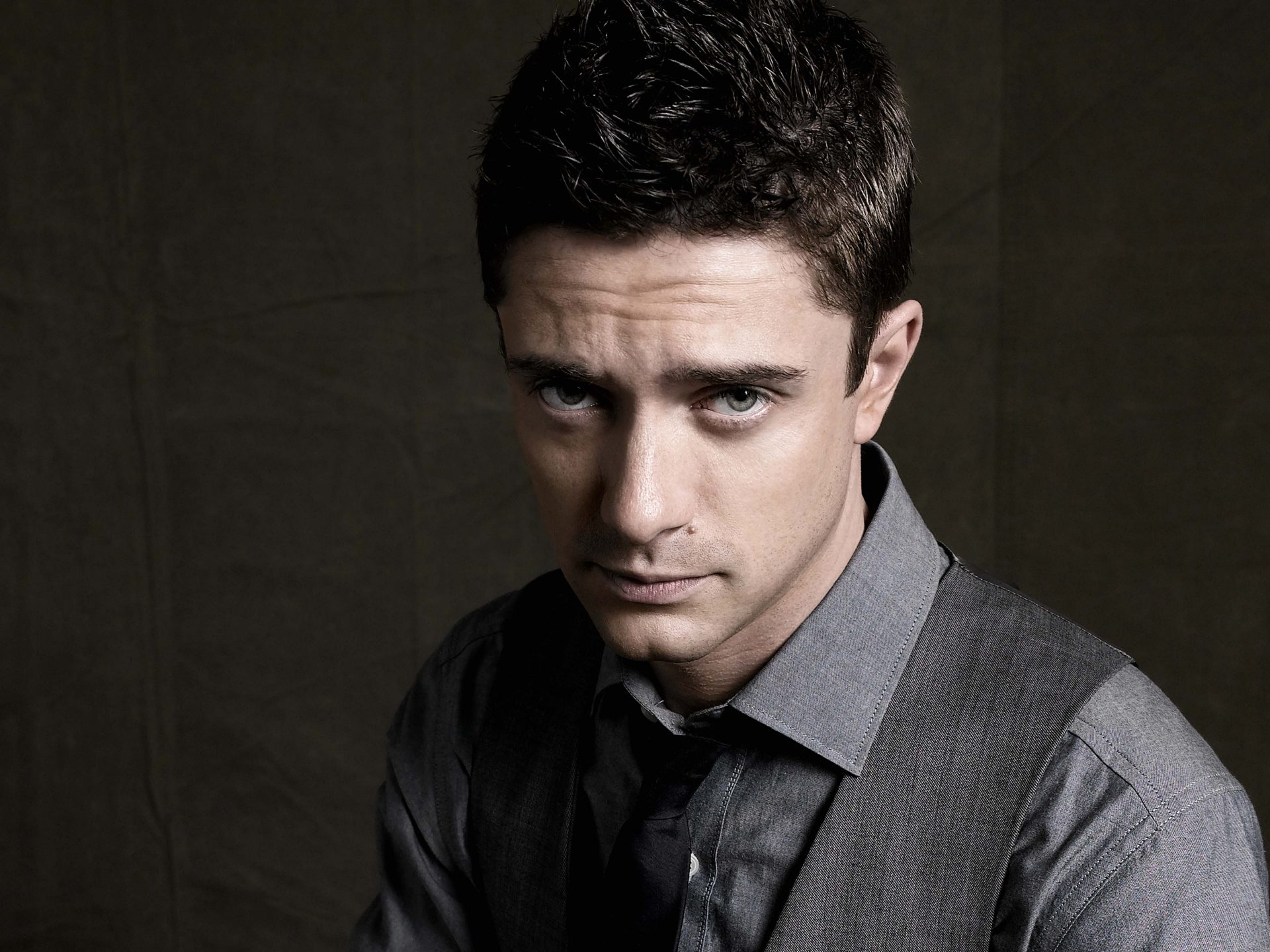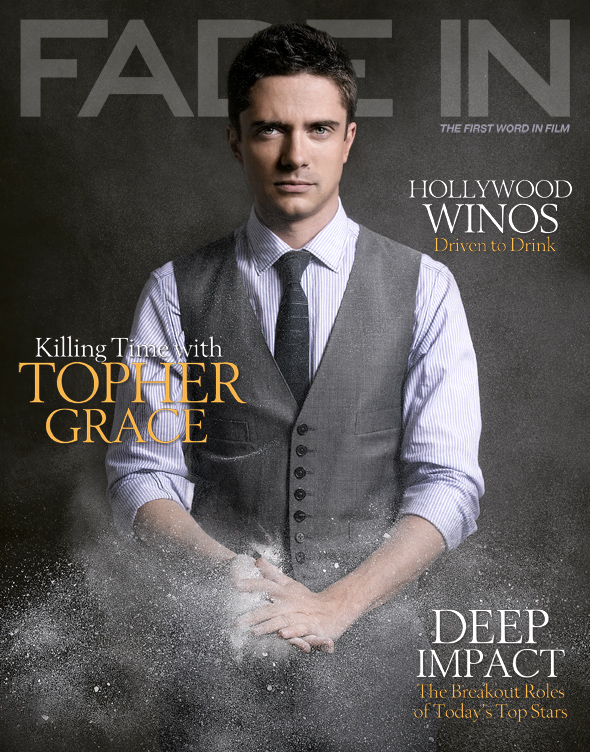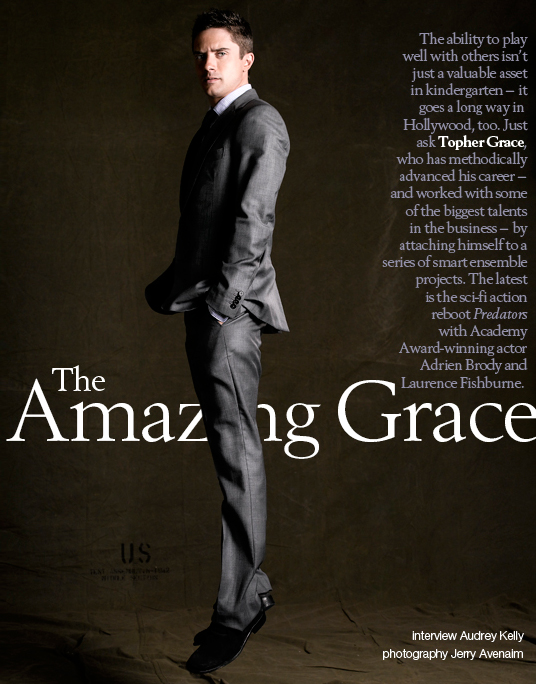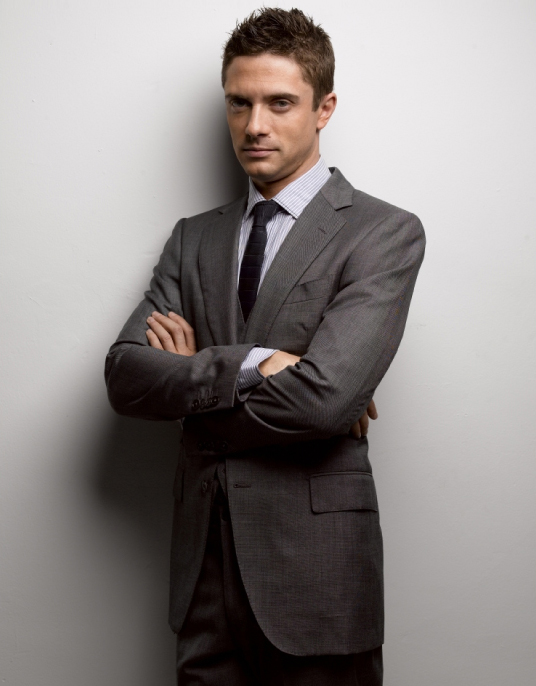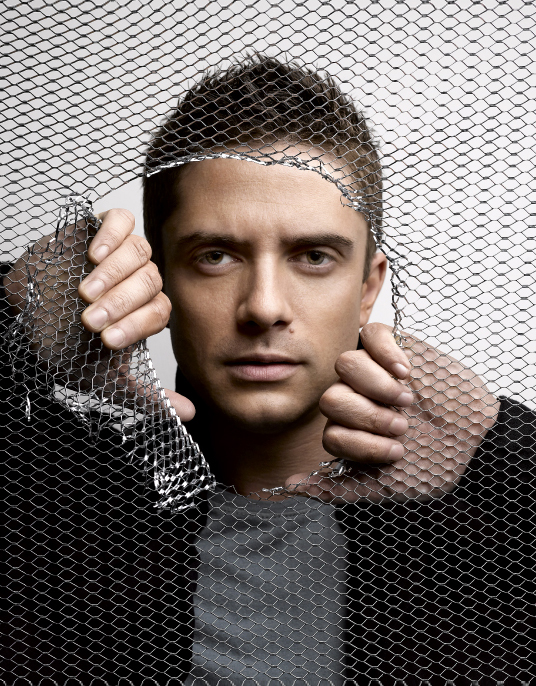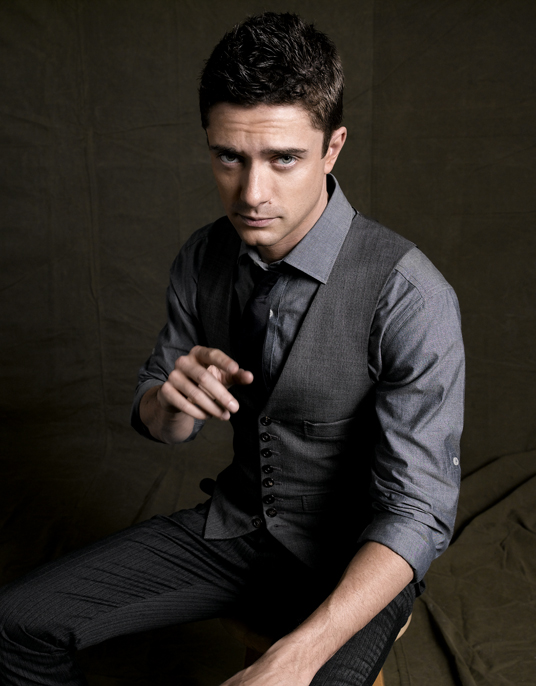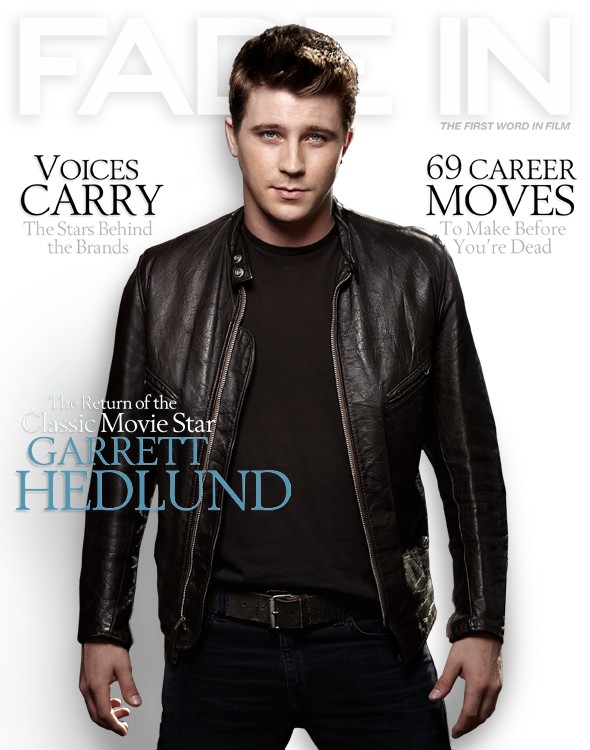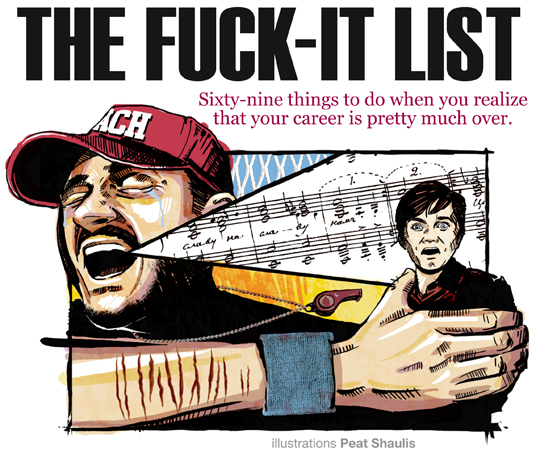 ost young actors are so hungry for experience — or a paycheck — that they’ll accept pretty much any role they’re lucky enough to be offered. Which may explain why the early resumes of so many well-known performers include dues-paying (and often rent-paying) genre schlock like Leprechaun (Jennifer Aniston), Children of the Corn V: Fields of Terror (Eva Mendes) and The Return of the Texas Chainsaw Massacre (Matthew McConaughey and Renée Zellweger).
ost young actors are so hungry for experience — or a paycheck — that they’ll accept pretty much any role they’re lucky enough to be offered. Which may explain why the early resumes of so many well-known performers include dues-paying (and often rent-paying) genre schlock like Leprechaun (Jennifer Aniston), Children of the Corn V: Fields of Terror (Eva Mendes) and The Return of the Texas Chainsaw Massacre (Matthew McConaughey and Renée Zellweger).A rare exception is Topher Grace, who has enjoyed the luxury of choice from the beginning of his career. A little over ten years ago, Grace was performing in a production of A Funny Thing Happened on the Way to the Forum at Brewster Academy, a New Hampshire boarding school, when he was noticed by Terry and Bonnie Turner, creators of the hit NBC sitcom 3rd Rock From the Sun, whose daughter, Lindsay, was a classmate. Impressed by Grace’s work, the Turners wound up casting him in their next project, That ’70s Show, which aired on Fox for eight seasons.
The series provided the Connecticut-bred Grace with the cash and clout to take his time while weighing feature offers. With an emphasis on quality over quantity, and a determination to play a character far removed from Eric Forman, his affable ’70s Show alter ego, he turned down a slew of teen flicks and made his big-screen debut in Traffic, as a cocky suburban kid with a hankering for hard drugs. The movie scored five Oscar nominations and won four, including a Best Director prize for Steven Soderbergh, one of Grace’s filmmaking idols. To ratchet up the envy factor even higher, in his most memorable scene, Grace went toe-to-toe and held his own — opposite Oscar winner Michael Douglas.
With such an auspicious beginning, not to mention favorable comparisons to Tom Hanks, Jack Lemmon and James Stewart, Grace could have bailed from his TV gig and jumped headlong into features. Instead, he stayed put, took his time and, choosing projects carefully, put together an impressive — and impressively eclectic — list of credits, including P.S., In Good Company and Spider-Man 3. He also reunited with Soderbergh for a pair of amusing cameos as an insufferably smug version of himself in Ocean’s Eleven and Ocean’s Twelve.
If Grace has a career strategy, it’s based on a few basic principles: be patient, don’t repeat yourself, never stop learning and always work with great people — preferably as part of an ensemble.
Case in point: Valentine’s Day, which was released in February of this year, three years after his last film, Spider-Man 3. A glossy rom-com with more than a dozen plum supporting roles (played by, among others, Julia Roberts, Jessica Biel, Queen Latifah, Bradley Cooper and Grace’s former ’70s Show costar Ashton Kutcher), it was miles from a big-budget comic-book adaptation, which made it an ideal fit for Grace.
Now, in what is shaping up as an even more radical departure for Grace, July 9 brings Predators, directed by Nimród Antal. Although it’s his first unabashedly muscle-flexing guys-on-a-mission flick, Predators, inspired by the 1987 sci-fi actioner Predator, starring Arnold Schwarzenegger, more than meets the quality standard: its producers include Robert Rodriguez and the cast is led by a pair of respected stars, Oscar winner Adrien Brody and Laurence Fishburne.
Shifting gears yet again, Grace will be back next year in The Double, a political thriller starring Richard Gere. He has also completed his first movie as producer, the 1980s-set comedy Young Americans, and he’s collaborating on the production of a TV series with veteran producer Jamie Tarses.
That’s a pretty busy run for a guy with a reputation for long breaks between projects. Then again, it’s a trait Grace cops to in his Fade In interview without apology: “I have no need to go super fast,” he says. “Learning along the way is more important.”
Predators: reboot, remake or sequel? All three, I believe. [Laughs] I’m serious. There are certainly things that connect the first Predator movie to this movie. So really, if you wanted to have the complete experience, you see just the first Predator and then this film. But it allows for everything else, and it also allows if you’ve never seen any of them to enjoy it. This is actually true. It might sound like what the studio would want me to say, but it’s true.
Look, if you’re gonna make the fourth or fifth movie in a franchise and try to reboot it and try to attract great actors like Adrien [Brody] and Laurence [Fishburne], and Alice Braga, then there has to be lots of stuff that’s new about it, even though there’s everything that you loved about the first one.
What I’ve been saying is that Predators is to Predator what Aliens is to Alien. Because Alien — which is Alien, the original movie — was kind of this mano a mano battle; and then the sequel, which James Cameron [directed] instead of Ridley Scott, was one of the great movie sequels of all time, in that it had mano a mano thing, it was a character study of this group of people. And this is almost that. It’s like Predator never really got its due, and I think this is what Robert [Rodriguez] was trying to do. There’s only one green screen shot in the entire movie. It’s really rare.
Really? I didn’t think there were any. There’s one. It’s at the very beginning. I’ve done green screen-heavy movies before, and I’ve never done so much in real life; and by the way, I would happily go right back to the green. As an actor, you are so much better informed by having stuff be in-camera, like having the monster there or having the effect there. But it’s a workout for the actor. It’s a workout for your imagination when it’s a green screen. Because you have to imagine everything. But [with Predators], it was just a physical workout. There was a day where we had to jump off a waterfall, and that’s what it said on the call sheet: “the gang jumps off a waterfall.” And then we went to a waterfall in Hawaii and we jumped off of it.
You showed up that day? Yeah. “Pain is temporary and film is forever” is an old expression the stunt guys taught us. And it’s true, because now when I watch it, I go, “Well, at least we got it on film.” It’s not like I jumped off a waterfall and I’m just telling you about it — it’s on the celluloid. We didn’t jump off a very high one; we jumped off a lower waterfall, and there were stunt guys. But everything that we could do, we did,and now, when I watch it, I’m glad I did it.
The best thing about my character, Edwin, is that he is probably the closest to the audience in terms of, What if you or I were put on an alien planet in this “Most Dangerous Game” situation that this group is in? Well, how would you react? It’s certainly how I would react. Like when I jumped off the waterfall, his reaction is pretty similar to what my reaction is. I didn’t have to pretend or act that much. So it’s actually an actor’s dream to be able to be in the situation exactly as it is.
Did you have to lobby hard for the part? No, I was lucky. I got sent the script. I was dubious about it, but it was just so well written and so tight. I saw Nimród and Robert were really aligned in what they both wanted to do.
“I don’t mind taking my time. I don’t know how my agents feel probably very differently. I remember thinking, ‘I like going to work in ensembles, because that’s what’s working.’ And that’s still all I do. Like, Cast Away would be my nightmare.”
“A lot of people want Hollywood to have this myth of, someone sees you at a bank and then, boom, you win the Academy Award. But really, you want to treat it like an apprenticeship, like it’s a craft or skill that you learn, and that can only come over time.”
Adrien adhered to a strict regimen for this film. What was yours in preparing for your role? The complete opposite of whatever Adrien did. He worked very hard.
Adrien had no sex, so you did the complete opposite? I didn’t know about that. Wait. I read about that in your magazine. Well, that is a level of commitment I am just not willing to put into any of my characters. [Laughs] I like acting, but maybe not that much. My character is very different from his. All I can really… this is annoying, because we did a foreign press day a month ago and I said, “I don’t know why I’m here, because I can literally say nothing about my character.” I didn’t know what questions anyone could ask me. But I was saying Edwin is a doctor, but not a very good doctor. [Laughs] That was the most information I could say without getting into trouble. And you really can get into trouble with these studios. It’s funny, though, with these films, people want to know — they think they want to know. Like, I wanted to know the ending of Lost, but I didn’t really want to know. If you really said, “I will tell you everything right now,” I would have said, “Actually, don’t tell me.” So it’s funny, everyone wants to know with these franchises, but then they don’t.
So even though it’s all over the Internet, you can’t talk about portraying a serial killer? Yeah, no.
There go all our serial killer questions. Sorry. That’s an element that really drew me to the project. The first thing is Robert Rodriguez. A lot of friends who have been involved with projects that he’s done have all had the most amazing time, and he’s a repeat offender. He’ll use actors over and over again, which is every actor’s favorite thing. So I was going to get into this camp somehow. When I was in high school, my mom was really into taking us to see foreign films, which were usually pretty boring. But she took us to see El Mariachi because it was this critically lauded Mexican film, and it was a total action movie. I was like, “Oh, my God, this guy is amazing.”
And he made it for $5 or something.
I remember when Desperado came out, I really knew that it was a sequel to that. I really loved that film. And when I first came out here, Sin City was out, and I knew a couple of people in that. That guy is such an artist. I’d heard that he has his own kind of little Hollywood down in Austin, so I was excited to read the script, but thought the odds of me really wanting to go be in a jungle for five months — if it’s a Predators film, I don’t know. I really liked the first Predator a lot, and watched it every time I played hooky from school, which was frequently.
Predator II it was OK, and then the spinoffs — I hadn’t seen all of them. But the script was great, and it had several twists in it, and it’s an actor’s favorite thing when you get to play something that’s kind of unexpected. Too much attention on the character previous to you going into the movie might kind of give away some elements about what’s really cool about it.
So however they want to approach the character, I leave to them [laughs] because I don’t want to give anything away.
Well, then, let’s talk about you… If one is to believe your IMDB profile, you presumably loved tennis, and considered playing professionally. I now realize, having gotten out of school, that was a high-school dream. I did happen to be OK for Brewster Academy in Wolfeboro, New Hampshire. That means I stood no shot. I played a pro once, like the summer before I went to college, someone who was ranked, like, 200th in the world or something. Thank God I sprained my ankle and did the play, because that’s when I got scouted — in that play in high school — for That ’70s Show. However good I am at acting, I am worse at tennis, I promise you.
You’re ambidextrous? No, that’s not true.
You have a large collection of baseball caps? Sadly, no, probably only this one.
Your favorite book is the Bible? I’ve never read the Bible. I’ve read sections of the Bible, but I’ve never read that all the way through. I heard that’s quite a long read.
And, as for music, you like anything by Barry White? No, that’s going to be from a character that I played — although I don’t hate Barry White.
Some women will love you for saying that. Oh, well, then I love Barry White.
All of those supposed factoids turned out to be wrong. What’s one thing people may not know about you? Well, all that stuff is wrong, so that stuff. I was in a position, when I was on the show, to really share a lot of my life with the world. At first my reaction was always, “Who would care?” First of all, I lead a very boring life. Second of all, just to push yourself on people is not me. I don’t know.
But then one could also argue, “Who wants forever to be looked at as your last or greatest character?” But you can do that through playing other characters. Like when I started the show, I thought, “This isn’t the only character I want to play.” I remember really waiting. There were a lot of teen movies that had characters that were very much like my character Eric Forman on That ’70s Show. I thought, “I’m going to really wait.” I had just been in college, and I couldn’t get laid. And here I am, and I have my own TV show. Who’d have thought that for any amount of money? If they were offering me a role in a film, I should do it. That’s where I was at. So I’m turning down these teen movies. Titanic had just come out, the Backstreet Boys and ‘N Sync. I waited until I read Traffic, and I thought, “This is about as opposite of Eric Forman as humanly possible.” But there’s a misnomer that you have to use your personal life to show people other dimensions. In fact, your personal life hurts you showing other dimensions. People will see you as what you actually are, and I’ve been very happy that there’s a lot of stuff that people don’t know about me, because I’m able to do really interesting turns in movies and play really different characters. So being really public only hurts your ability to do that.
Does it bother you when people still associate you with your character, Eric, on the show? That was a really great character. He doesn’t have a catchphrase, or he doesn’t have any specific way that he had to be in any scene. So I was very lucky that way. Subsequently all my memories of the show are really great, and I loved working with all those cats. I just did a bunch of publicity with Ashton [Kutcher] for Valentine’s Day, with all those cats. There was a great weekend where the movie had just grossed $100 million, and he and I were in London having champagne — how much fun can you have with another human being in your life? The blessing about the show is that we were all young enough when it ended that we can all have second chapters and second identities. So we’ve all been really lucky, and close, and the only bummer when people talk about the show is that I wish that I could just go back.
Really? Don’t get me wrong; I’m not dying to do the reunion show. But I do just want to hang out with those kids. It was a really fun way to grow up. I don’t have a lot of negative memories from the show, you know. It looked like six kids sitting around having fun in the basement, and it pretty much was. We were teenagers and in our young twenties; it was awesome.
That’s interesting. Because one would assume at some point it went from being pleasant to being overwhelming, being that famous at such a young age on a show syndicated all around the world. It’s the opposite. I talked to Ashton about this a little bit, too. There was a moment where, about four seasons in, it went into syndication. It was when Ashton and I had started doing more films outside the show, so not only were we working harder and using our weekends and summers and free time — you kind of get the summer off when you’re doing a show like that — we’re working so hard, and syndication was really a level of fame that’s very different than when the show is just on Fox, because it’s literally on every day, all the time, five channels, and that moment was really tough. Also, we were twenty-four, and you don’t really have a full identity of yourself. So that was interesting, and that was probably the height of difficulty. By the way, there are people working in mines, so it was not very hard; it was just, you’re trying to figure yourself out anyway at that age, and then to have so much public attention. But now everyone’s kind of used to it, and it’s very nice.
Would you ever go back to TV? There are a couple of great things about having been on a sitcom at a young age. The greatest is that you actually get paid so well. Or they used to — I don’t know what they pay now. It puts you in a position where you don’t have to do anything but what you really want to do. Now, you’re right, there’s some great stuff on cable, and I’m not saying no. But I really love film. I just love watching it. If you are a young actor coming to Hollywood, and you can choose what you want to do, don’t go too far, too fast. TV’s a great way to learn your whole thing.
Well, they’re afraid they’ll get stuck there, which is a legitimate concern. No, I understand that is a concern, yeah.
Studios are hellbent on making leading men out of these really young actors now, aren’t they? I’m not really the right person to answer that. I don’t mean I’m uncomfortable answering it; I just don’t think enough about what that’s all about. Certainly I’m saying I like taking my time. So maybe it feeds into that thing: people really taking their time to learn their stuff. A lot of people want Hollywood to have this myth of, someone sees you at a bank and then, boom, you win the Academy Award. But really, you want to treat it like an apprenticeship, like it’s a craft or skill that you learn, and that can only come over time.
Is that what you did, took your time? Yeah. I have a little bit of a Bobby Fischer thing. I’m passionate about acting, I really love it, but I don’t love doing it on projects that I’m not really that into. And there was about a year when the show ended that I promised myself I would take off. I had used the majority of my twenties to work really hard. I bought an apartment in New York and I lived there for a year and just wanted to touch base with life. So I took a year to plug back into that, and I did everything I’ve never done. I went skydiving. I lived in New York. Other things I can’t ever talk about — for good reasons. I loved making Valentine’s Day. I loved [Predators], and I’m about to go do this thing with Richard Gere — I was just in Detroit this week.
The Double. Yeah… oh, yeah, this is Fade In. Yeah, of course. [Michael] Brandt and [Derek] Haas. They saved a great script for them to direct and produce, trust me. Brandt is directing and Haas is producing. They are really great, smart guys, and Richard’s amazing. I just met Richard for the first time; we hung out last weekend.
Next thing you know, the Dalai Lama. I hope the Dalai Lama comes and hangs out — that would be amazing. All the films I do are all very different. Brandt and Haas are the right guys to write this paranoid political thriller; and Robert Rodriguez, that’s the guy to reboot Predator, to do a hard-R, bloody monster movie; and Garry Marshall is the right guy to do a romantic comedy [like Valentine’s Day].
I don’t mind taking my time. I don’ t know how my agents feel — probably very differently. I remember thinking, “I like going to work in ensembles, because that’s what’s working.” And that’s still all I do. Cast Away would be my nightmare. I loved the ensemble on That ’70s Show, and I loved the ensemble on Traffic, and I loved working with Dennis [Quaid] and Scarlett [Johansson on In Good Company], and I loved this movie. And I loved working with Adrien and Laurence.
What does that mean? You don’t want the responsibility of carrying a film? Definitely. No one wants to do a one-man show if you can have the help of… I don’t know. You’re an idiot in any job, not just acting, if you think you are the authority and the best person to do everything. I am a perfectionist about what I do, but I just love being on a dream team. Take That ’70s Show: when you hit the ball to Ashton… I can’t do what he does. Then he hits it over to Wilmer [Valderrama]. Same thing in Valentine’s Day, by the way — talk about an ensemble. When we were in Predators, we’re out there in the jungle, you get to know really quickly what everyone does well.
Are you also concerned with being blamed for bad box office? You have that added pressure when you are the star. That’s true; it’s great to share that burden. But if you talk to the majority of working actors who play lead roles in Hollywood, most of them will tell you it’s all about the art. Not everyone is thinking about, for lack of a better word, “the art,” then, yeah, I want to work with the best. Like, when I heard Adrien Brody was playing the guy [in Predators] instead of some macho guy who couldn’t act…This guy won an Academy Award. I want to act with him, period. Plus we’re going to really sell that this is an alien planet. That’s not the easiest thing to do. [With] those kind of team members, two things happen: one, when you’re having a moment where you go “I’m not sure,” you can pass the ball; two, through osmosis, you’re getting better by being around these people. To have worked with people like Laura Linney [in P.S.] and Richard Gere [in The Double], or to do some days with Brad Pitt and George Clooney [in the Oceans movies]…you just hope that being around them, a little bit of the dust is going to go on you. Any young actor who wants to go it alone is just [not aware of] how much time you have to learn. So I would say if Cast Away came my way, I would pass on it, just because I don’t think anyone wants to see me alone on a desert island. Tom Hanks is the guy to do Cast Away.
What is that expression? “A rising tide lifts all boats,” or something like that? But if the tide comes in, all the boats rise. I remember when I used to play tennis and I’d play opposite somebody worse than me, I would lose to them. And if I played opposite someone better, my game would rise. And that’s how I see it.
Luckily, the first film I did [Traffic], I did with an [Oscar-winning actor], Michael Douglas. It’s the first time I’d shot outdoors in my life, and it’s with this guy. Talk about coming with your A game, just showing up and being ready. And he was someone who also came from television and was happy to teach me a couple of things…although it wasn’t unless I asked. But he really opened my mind. I’m going to work with all the greats in my time. That would beat anything.
Does that mean you choose your roles based on cast first? The first thing is going to be the story. I have this theory that the reason everyone can tell from that [two-minute trailer] in the theatre [whether they’re going to see a film or not], is that there’s that one-second review that happens right afterward: “That actually looks good,” or people go, “Oh, that looks terrible.” They immediately know. You’d think with 180 minutes, or however long a film is, you could really fool people, but essentially you can never get away from the question that the film is asking. So even in those two minutes you go, “Oh, do I want to know the answer to that question or not?” It’s the same thing about reading a full script. The first thing is, “Is this a story that’s compelling and will other people find it compelling?” And then second is, “What is my utility to this?” And then third is, “Who’s involved, starting with the director?” This is my own process.
Has that always been your process? Yeah, it has. Actually, it was a more general, instinctual feeling of, “Do I like this movie?” Now I could break down to you what the real elements are that I care about in order, but what I’m most proud of is all the films I passed on before Traffic.
“The best thing about my character, Edwin, is that he is probably the closest to the audience in terms of, What if you or I were put on an alien planet in this ‘Most Dangerous Game’ situation that this group is in? Well, how would you react? It’s certainly how I would react.”
Oh, do tell. That wouldn’t be right, but I wanted to show the furthest point from That ’70s Show that I could get. So I’m more proud that I read stuff. Like I said, I was in college and couldn’t get a date with a girl, and then to be having some agent show me a script and I say, “No, not good enough.” I’m
talk about what that relationship is. But I’m very lucky that, early on, they understood that I didn’t want to play a part for money, or for any other reason than it was exciting. If you get with the right people who understand that, that actually makes for a healthy career — probably money-wise, anyway. There are tons of projects that I probably should have done.
Didn’t you feel the pressure from your reps to take a job for the money? How do you deal with that? That’s a huge question. Say I’m a real Jerry Maguire type. Like, I would take the money out of it, which is the way all my friends who are actors would hate me for saying. But there was more a motivation to do the right things artistically when we didn’t get paid as much for certain kinds of films. I don’t have to worry about that because I choose so many different types of films, I don’t make a lot of money, really, compared to what [I would earn] if I sat down and said, “If I play this one role and this one movie, I could make a lot more money.” And by the way, I’m very happy, so I’m not complaining about it. I want to do lots of different things. You would get more punished for playing the same role over and over again just to get monetarily rewarded. It hurts longevity.
So instead you’re obsessed with playing the opposite of the last thing you did? Yes, but not doing it so obviously. I don’t want to do a romantic comedy, horror movie, rent-a-car movie… Not just [that] it’s 180 degrees [different], but it’s different in every way. Like I was just at the firing range with Richard Gere; we were doing fight choreography. And I [thought], “Never done this before.” There’s tons of stuff in that film that I’ve never done before. It makes it so much more fun.
You have wanderlust. That’s really well said, yeah. That’s really how I feel about acting. It just makes it so much more adventurous, yeah, better, if there’s an element of adventure to each role, because when you see actors at the beginning of their career and you can tell they’re so thrilled to be in a movie, and then they’re in the same movie ten years later — but they know the steps of the dance a little too well. I want to hopefully keep having that [element of adventure]. Like this interview is an adventure, because it’s not the same interview that I normally do.
Speaking of adventure, you’ve also embarked on a producing career. Your first film, Young Americans, is set to bow in January, but the film has been in the can for a couple of years now. What happened? We’re very lucky that [Relativity Media CEO] Ryan Kavanaugh was good friends with [Imagine Entertainment’s] Ron Howard and Brian Grazer, who have been huge champions of the film, and that we found a really great home for it that really appreciated it for what it was. We didn’t have to change anything about it. It has another great ensemble: Anna Faris and Dan Fogler are amazing in the movie. Teresa Palmer and Demetri Martin. Just the greatest young cast, and it takes place all one night in the ’80s.
Love the ’80’s. I love the ’80s, too. There hasn’t been that movie for the ’80s. There’s Dazed and Confused for the ’70s. Ron [Howard] obviously knows a lot about American Graffiti, for the early ’60s. So we were just thrilled to have found the right home. And they’ve been great partners. Technically, I produced it; but to work with people like Brian Grazer [and] those guys. It’s like a master class in how to do it.
What was that experience like? There was a lot of on-set stuff that I had to deal with that I normally don’t have to deal with as an actor, which is great; I just go sit in my trailer. But then there’s also a lot of fun stuff that I never get to be a part of normally. It was interesting to be a part of post [production] — that was a first. I had never seen what happens in the editing room. There’s a lot of stuff that can change a film there.
How did the idea for the film come about? Well, we had an idea for that kind of slice-of-life [story] — all in one night, someone’s life changes — and Ron and Brian responded to it really well. I’m happy to have an executive producer title, but they really are the producers, and [it was] amazing to just work with and learn from them.
So here you are an official hyphenate. Weren’t you the one who said that when an actor becomes, for example, an actor-director — Yeah, that might have been earlier in my career, but, yes when I did the junket for Traffic. Because everyone in my life, and I was twenty or twenty when Traffic came out, was ready to direct or go write their script. And I thought, “Man, I feel like I’m barely understanding what happened to this experience.” A lot of the older actors understood it, and Steven Soderbergh was interesting to be around, and [producer] Laura Bickford, the people who were much more involved every day on the film. I thought it was wrong for young actors to say after they’ve been in one film, “I’m ready to write.” And by the way, full disclosure: I did not write the movie [Young Americans]. I did not produce it. I only executive-produced it, and I apprenticed the whole thing.
What does that mean? Less than producer. [Laughs] It’s what I’ve come to understand it as. But it was good, because I was able to learn a lot but not have to be the captain of anything. And I still have no yen to direct. Actually, having had this experience, I have less interest in directing.
You’re also producing a TV show of your own. That’s right. Well, that’s an interesting thing, too. We got obsessed with the ’80s when we were doing that movie. And someone was at a karaoke bar singing “Man in Motion,” that awful song, [singing], “Gonna be your man in motion, all I need is a pair of wheels/ Take me where my future’s lying, St. Elmo’s Fire.” So we thought we were joking around about it, but then I thought, “Well, that would actually make a good show, if it was modernized…” So we sold it to ABC, and similarly, by the way, we went and partnered up with [producer] Jamie Tarses.
Who is “we”? [Me and] my producing partner, Gordon Kaywin.
Do you have a company? It’s called Sargent Hall Productions. Gordon and I were roommates in boarding school in Sargent Hall dorm. We made friends, and he’s worked in the industry since I came out here… a little bit after he graduated college. Finally we said, “Hey, let’s do some stuff.” We had some ideas. But we did wind up going to Imagine, because we’re the same age and we want to be sponges. I’m talking about the actors, like I want to do on this side, which is Brian and Ron; those guys have the answer to everything. Similarly, Jamie Tarses is really great. Actually, no one knows this story: I was a page at ABC. I actually worked in the casting office, and no one ever cast me or even thought about it. It was called a senior project at boarding school. You could leave for a month, [because] someone Dad knew said, “You can be page at ABC.” So I had to ask Jamie Tarses, “Sparkling or flat?” because she was the president of ABC at the time at the [advertising] upfronts, and then, weirdly enough, the next year at the upfronts, I was there with That ’70s Show — a weird twist of fate. And some kid came up to me and said, “Sparkling or flat?” and I said, “You’re doing a good job.” It was great when I met Jamie, and I said, “We worked together before, you know? I got you sparkling water at Radio City Music Hall.”
Any plans to collaborate with Ashton on a show? No. I’d love to. We’ve only had amazing times working together.
You recently worked with Kate Bosworth. Your Funny or Die short has to be one of the top three they’ve ever done. Thank you, that’s the nicest — by the way, you have a good sense of humor; so thank you, because you’re probably a hard laugh. Some people are a really easy laugh.
Dry sense of humor. Yeah, I have a dry sense of humor, too. Yeah. Thank you. We had fun. Kate and I actually grew up in the same hometown. So before we did Win A Date with Tad Hamilton! together, I had chaperoned on a ski trip that she was on. My sister was on a soccer team with her; I’ve known her a long time. I love Brett Gelman, the comedian who kinda wrote that, and is in it. I remember them saying, “We’ll never get Kate,” and I was saying, “You know what? I actually think you’ll totally get her. She totally gets this humor, and she’s hilarious.” She’s really great. We had a lot of fun doing that.
Were you trying to pick a fight with any director in particular? No, it was more we wanted to make fun of actors.
How many takes did you do? We had to do the scene at the end, and we had to say all those [dirty lines]. I really was losing it. I couldn’t even count on That ’70s Show how many times I broke. I never fully got through the last scene once. Thank God for editing, I’m glad you got that. That’s good.
What other projects do you have in the works at Sargent Hall? Well, we are going real slow. One film, one TV show. We’re hoping maybe to sell another TV show this buying cycle. But I would say, something that is a part of my nature is — maybe you’re picking up on this from this interview — I have no need to go super fast. I am really happy learning and going at the right level at which it should go, or even maybe a little bit slower, and just making sure I really learn from each experience. Don’t just run through an experience to get to the next one.
So you’re not feeling like Will Smith and you have to be the most famous face on the planet? Let me tell you something about Will Smith. He is better than I am. No, I’m sure of it a hundred times over. So if I were more talented, or smarter, or whatever — I’m not being self-effacing, I really mean that. I would go as fast as I can. But I want to learn. By the way, I’ve got an album dropping soon.
Looking to the future, where do you see yourself in ten years? Man, on the cover of Fade In magazine, or tenth anniversary of the best cover they’ve ever had. No, I don’t know. I would say my whole deal is, I don’t want to really know. If I was leading the career where I thought I knew, that would be a bummer. But I hope still acting, not to put too fine a point on it. I hope I’ve done a pupu platter of lots of different things. Are those still popular? Those were big in the ’80s, right?
You’re still in Hawaii. Pupu platter? No, I just want a little bit of everything. Nothing is more opposite of Valentine’s Day than Predators, and nothing is more opposite to Predators than The Double, this movie I’m about to go do. Then I’m just psyched to keep charting a course like that and see what happens. By the way, no one ever described it better before: wanderlust. Yeah, that makes total sense. That is how I will describe it from now on. So if you ask someone with wanderlust in terms of geography, they would tell you, “I’ll be in India.” The whole point is someplace they haven’t been.
But that doesn’t mean you don’t have goals. Personally? I don’t know. Off the record, I was going to say I was hoping to open my shelter for runaway teenage girls. Yeah, it’s a dream.
One could take that the wrong way. I would be bummed if I’d settled into one thing. It’s more what I’m trying to avoid, because it’s very easy to do that. The whole system is geared toward making you settle into where you’re more of a commodity when you do that. So if I’ve avoided that, that’s where I am in ten years. Plus, Gisele and I are together, but I’m still really good friends with Tom Brady; he’ll still always be welcome at our house after the divorce.

